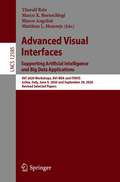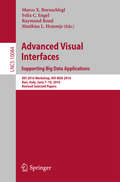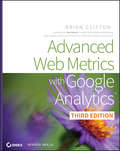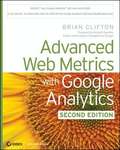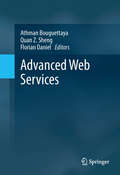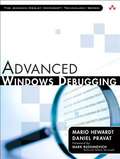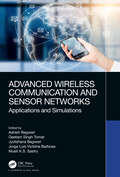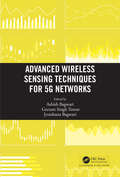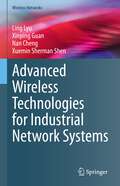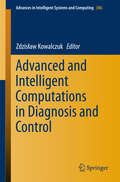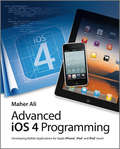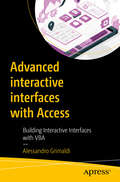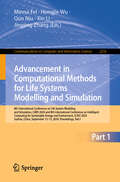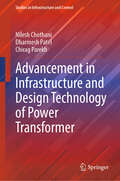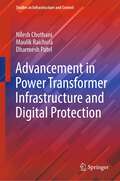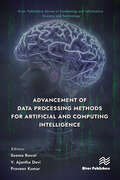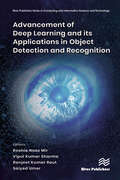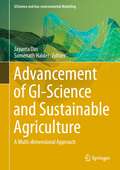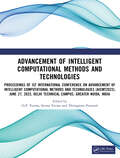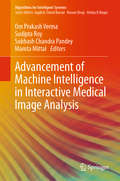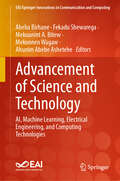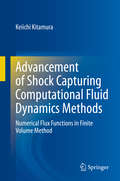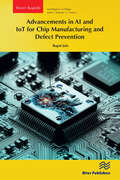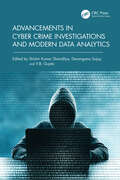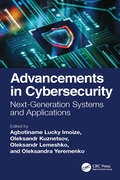- Table View
- List View
Advanced Visual Interfaces. Supporting Artificial Intelligence and Big Data Applications: AVI 2020 Workshops, AVI-BDA and ITAVIS, Ischia, Italy, June 9, 2020 and September 29, 2020, Revised Selected Papers (Lecture Notes in Computer Science #12585)
by Marco X. Bornschlegl Matthias L. Hemmje Marco Angelini Thoralf ReisThis book constitutes the thoroughly refereed post-workshop proceedings of the AVI 2020 Workshop on Road Mapping Infrastructures for Artificial Intelligence Supporting Advanced Visual Big Data Analysis, AVI-BDA 2020, held in Ischia, Italy, in June 2020, and the Second Italian Workshop on Visualization and Visual Analytics, held in Ischia, Italy, in September 2020. The 14 regular papers in this volume present topics such as big data collection, management and curation; big data analytics; big data interaction and perception; big data insight and effectuation; configuration and management of big data storage and compute infrastructures, services, and tools; advanced visual interaction in big data applications; user empowerment and meta design in big data applications; prediction and automation of big data analysis workflows; as well as data visualization; information visualization; visual analytics; infographics; and design.
Advanced Visual Interfaces. Supporting Big Data Applications: AVI 2016 Workshop, AVI-BDA 2016, Bari, Italy, June 7–10, 2016, Revised Selected Papers (Lecture Notes in Computer Science #10084)
by Marco X. Bornschlegl Felix C. Engel Raymond Bond Matthias L. HemmjeThis book constitutes the thoroughly refereed post-workshop proceedings of the AVI 2016 Workshop on Road Mapping Infrastructures for Advanced Visual Interfaces Supporting Big Data Applications in Virtual Research Environments, AVI-BDA 2016, held in Bari, Italy, in June 2016. The 10 revised full papers in this volume present the elaborated outcome of the initial position papers capturing the results oft the roadmapping discussions in the workshop at which comments of several external reviewers for these full publications were also integrated.
Advanced Web Metrics with Google Analytics
by Brian CliftonGet the latest information about using the #1 web analytics tool from this fully updated guideGoogle Analytics is the free tool used by millions of web site owners to assess the effectiveness of their efforts. Its revised interface and new features will offer even more ways to increase the value of your web site, and this book will teach you how to use each one to best advantage. Featuring new content based on reader and client requests, the book helps you implement new methods and concepts, track social and mobile visitors, use the new multichannel funnel reporting features, understand which filters to use, and much more. Gets you up and running with all the new tools in the revamped Google Analytics, and includes content requested by readers and users especially for new GA usersCovers social media analytics features, advanced segmentation displays, multi-dashboard configurations, and using Top 20 reports Provides a detailed best-practices implementation guide covering advanced topics, such as how to set up GA to track dynamic web pages, banners, outgoing links, and contact formsIncludes case studies and demonstrates how to optimize pay-per-click accounts, integrate AdSense, work with new reports and reporting tools, use ad version testing, and moreMake your web site a more effective business tool with the detailed information and advice about Google Analytics in Advanced Web Metrics with Google Analytics, 3nd Edition.
Advanced Web Metrics with Google Analytics, 2nd Edition
by Brian CliftonPacked with insider tips and tricks, this how-to guide is fully revised to cover the latest version of Google Analytics and shows you how to implement proven Web analytics methods and concepts. This second edition of the bestselling Advanced Web Metrics with Google Analytics is the perfect book for marketers, vendors, consultants, and Webmasters who want to learn the installation, configuration, tracking techniques, and best practices of Google Analytics. Google Analytics is a free tool that measures Web site effectiveness and helps users better understand how web site performance; this book is a detailed usage guide written by one of the software's original creators Explains what filters keep data accurate, how to measure Flash usage and tag for e-mail marketing, and what visitor segmentation provides the most useful feedback Examines principles and practices of Web analytics, then shows how to use GA's reports and how to track dynamic Web pages, banners, outgoing links, and contact forms Discusses advanced setups for configuring goals and filters, how to integrate GA with third-party systems, and how to leverage the new API Advanced Web Metrics with Google Analytics, Second Edition is valuable for both novice and experienced users of Google Analytics.
Advanced Web Services (Advances In Database Systems Ser.)
by Quan Z. Sheng Athman Bouguettaya Florian DanielWeb services and Service-Oriented Computing (SOC) have become thriving areas of academic research, joint university/industry research projects, and novel IT products on the market. SOC is the computing paradigm that uses Web services as building blocks for the engineering of composite, distributed applications out of the reusable application logic encapsulated by Web services. Web services could be considered the best-known and most standardized technology in use today for distributed computing over the Internet. This book is the second installment of a two-book collection covering the state-of-the-art of both theoretical and practical aspects of Web services and SOC research and deployments. Advanced Web Services specifically focuses on advanced topics of Web services and SOC and covers topics including Web services transactions, security and trust, Web service management, real-world case studies, and novel perspectives and future directions. The editors present foundational topics in the first book of the collection, Web Services Foundations (Springer, 2013). Together, both books comprise approximately 1400 pages and are the result of an enormous community effort that involved more than 100 authors, comprising the world's leading experts in this field.
Advanced Windows Debugging, 1st Edition
by Mario-Hewardt Daniel PravatThe First In-Depth, Real-World, Insider’s Guide to Powerful Windows Debugging <P><P>For Windows developers, few tasks are more challenging than debugging–-or more crucial. Reliable and realistic information about Windows debugging has always been scarce. Now, with over 15 years of experience two of Microsoft’s system-level developers present a thorough and practical guide to Windows debugging ever written. <P><P>Mario Hewardt and Daniel Pravat cover debugging throughout the entire application lifecycle and show how to make the most of the tools currently available–-including Microsoft’s powerful native debuggers and third-party solutions. <P><P>To help you find real solutions fast, this book is organized around real-world debugging scenarios. Hewardt and Pravat use detailed code examples to illuminate the complex debugging challenges professional developers actually face. From core Windows operating system concepts to security, Windows® Vista™ and 64-bit debugging, they address emerging topics head-on–and nothing is ever oversimplified or glossed over! <P><P>This book enables you to <ul> <li>Master today’s most powerful Windows debugging tools, including NTSD, CDB, WinDbg, KD, and ADPlus</li> <li>Debug code that wasn’t designed or written for easy debugging Understand debuggers “under the hood,” and manage symbols and sources efficiently</li> <li>Debug complex memory corruptions related to stacks and heaps</li> <li>Resolve complex security problems</li> <li>Debug across processes: identity tracking, RPC debugger extensions, and tracking IPCs with Ethereal</li> <li>Find and fix resource leaks, such as memory and handle leaks.</li> <li>Debug common thread synchronization problems</li> <li>Learn when and how to write custom debugger extensions</li> <li>Perform “postmortem debugging” using crash dumps and Windows Error Reporting</li> <li>Automate debugging with DebugDiag and the Analyze Debugger command</li> </ul> <P><P>Whether you’re a system-level or application developer, Advanced Windows Debugging delivers the deep understanding of debugging that could save you weeks on your very next project.
Advanced Wireless Communication and Sensor Networks: Applications and Simulations
by Ashish Bagwari Geetam Singh Tomar Jyotshana Bagwari Victória Barbosa, Jorge Luis Sastry, Musti K.S.This book covers wireless communication, security issues, advanced wireless sensor networks (WSNs), routing protocols of WSNs with cross-layer solutions, emerging trends in the advanced WSNs, power management, distributed sensing and data gathering techniques for WSNs, WSNs security, applications, research of advanced WSNs with simulation results, and simulation tools for WSNs. Features: Covers technologies supporting advanced wireless communication systems, sensor networks, and the conceptual development of the subject. Discusses advanced data gathering and sharing/ distributed sensing techniques with its business applicability. Includes numerous worked-out mathematical equations and formulas, as well as essential principles including figures, illustrations, algorithms, and flow charts. Provides pervasive background knowledge including both wireless communications and WSNs. Covers wireless networks as well as sensor network models in detail. This book is aimed at graduate students, researchers, and academics working in the field of computer science, wireless communication technology, and advanced WSNs.
Advanced Wireless Sensing Techniques for 5G Networks
by Ashish Bagwari, Geetam Singh Tomar and Jyotshana BagwariThis book written for students of electronics and communication, students of computer science and communications engineers addresses topics such as Introduction of CRN, Advanced spectrum sensing techniques, Cooperative sensing techniques, Distributed sensing techniques, Issues in advanced sensing techniques, and Applications of 5G Networks. It provides new algorithms, explores recent results, and evaluates the performance of technologies in use in this area. It also provides new research topics and sensing techniques related to 5G networks for researchers.
Advanced Wireless Technologies for Industrial Network Systems (Wireless Networks)
by Xuemin Sherman Shen Nan Cheng Xinping Guan Ling LyuThis book provides a comprehensive overview of wireless technologies for industrial network systems. The authors first describe the concept of industrial network systems and their application to industrial automation. They then go on to cover the role of sensing and control in industrial network systems, and the challenge of sensing and control in the industrial wireless environment. Then, the existing techniques for resource efficiency information transmission are introduced and studied. Afterward, the authors introduce sensing and control-oriented transmission for industrial network systems, which take advantage of spatial diversity gain to overcome the interference and fading, which in turn improves the transmission reliability without expending extra spectrum resources and enlarging the transmission delay. Subsequently, edge assisted efficient transmission schemes are introduced, which integrate the capacities of communication, computing, and control to relieve the contradiction of resource limitation and massive data. Finally, the authors discuss open research issues and future works about information transmission in industrial network systems.
Advanced and Intelligent Computations in Diagnosis and Control (Advances in Intelligent Systems and Computing #386)
by Zdzisław KowalczukThis book is devoted to the demands of research and industrial centers for diagnostics, monitoring and decision making systems that result from the increasing complexity of automation and systems, the need to ensure the highest level of reliability and safety, and continuing research and the development of innovative approaches to fault diagnosis. The contributions combine domains of engineering knowledge for diagnosis, including detection, isolation, localization, identification, reconfiguration and fault-tolerant control. The book is divided into six parts: (I) Fault Detection and Isolation; (II) Estimation and Identification; (III) Robust and Fault Tolerant Control; (IV) Industrial and Medical Diagnostics; (V) Artificial Intelligence; (VI) Expert and Computer Systems.
Advanced iOS 4 Programming
by Maher AliWith Advanced iOS 4 Programming, developers have the expert guidance they need to create amazing applications for Apple's iPhone, iPad, and iPod touch.Inside, veteran mobile developer Dr. Maher Ali begins with a foundation introduction to Objective C and Cocoa Touch programming, and then guides readers through building apps with Apple's iPhone SDK 4 - including coverage of the major categories of new APIs and building apps for the new Apple iPad.This book concentrates on illustrating GUI concepts programmatically, allowing readers to fully appreciate the complete picture of iOS 4 development without relying on Interface Builder. In addition, Interface Builder is covered in several chapters.Advanced iOS 4 Programming delves into more advanced topics going beyond the basics of iOS 4 development, providing comprehensive coverage that will help you get your apps to the App Store quicker.Key features include:Objective-C programming language and runtimeInterface BuilderBuilding advanced mobile user interfacesCollectionsCocoa TouchCore Animation and Quartz 2DModel-view-controller (MVC) designsDeveloping for the iPadGrand Central DispatchParsing XML documents using SAX, DOM, and TouchXMLWorking with the Map Kit APIRemote and Local Push NotificationBlocks (closures) in Objective-CBuilding advanced location-based applicationsDeveloping database applications using the SQLite engineGameKit framework
Advanced interactive interfaces with Access: Building Interactive Interfaces with VBA
by Alessandro GrimaldiExplore and learn advanced techniques for working with graphical, interactive interfaces that can be built in Access. This book starts with best practices and tips to write code using VBA, and covers how to implement them in a real-world scenario. You will learn how to create and use VBA classes. An introduction to the binary code and the "bit vector" technique is discussed, followed by the implementation of a drag-and-drop engine. You also will learn how to design a timeline, and make it scrollable. What You Will Learn Write readable, easy-to-maintain code Add a drag-and-drop engine to an Access application Apply variations to the drag-and-drop technique to create different graphical effects Embed a scrollable timeline in an Access application, on which objects can be dynamically placed Who This Book Is For VBA developers
Advancement in Computational Methods for Life Systems Modelling and Simulation: 8th International Conference on Life System Modeling and Simulation, LSMS 2024 and 8th International Conference on Intelligent Computing for Sustainable Energy and Environment, ICSEE 2024, Suzhou, China, September 13–15, 2024, Proceedings, Part I (Communications in Computer and Information Science #2216)
by Xin Li Jingjing Zhang Qun Niu Minrui Fei Hongjie WuThe five-volume set constitutes the thoroughly refereed proceedings of the 8th International Conference on Life System Modeling and Simulation, LSMS 2024, and of the 8th International Conference on Intelligent Computing for Sustainable Energy and Environment, ICSEE 2024, which were held during September 13-15, in Suzhou, China. The 35 papers presented were carefully reviewed and selected from over 496 submissions. The LSMS and ICSEE international conference series aim to bring together international researchers and practitioners in the fields of advanced methods for life system modeling and simulation, as well as advanced intelligent computing theory, methodologies, and engineering applications in achieving net zero across all sectors to tackle the global climate change challenge.
Advancement in Infrastructure and Design Technology of Power Transformer (Studies in Infrastructure and Control)
by Dharmesh Patel Nilesh Chothani Chirag ParekhThis book provides a comprehensive overview of both conventional and research advancements in power transformer design, along with numerical solutions. This book is useful for researchers and those working in transformer design. The book provides a comprehensive philosophy of different computerized design schemes used for the transformer. It also describes strategies for reducing loss and minimizing the design cost of the transformer. Researchers working on the design of power transformers can discover innovative algorithms and novel schemes for transformer design, as well as related contents. Furthermore, researchers can design innovative schemes by referring to the content of the chapters in this book.
Advancement in Power Transformer Infrastructure and Digital Protection (Studies in Infrastructure and Control)
by Dharmesh Patel Nilesh Chothani Maulik RaichuraThis book provides an overview of a power transformer infrastructure and comprehensive digital protection of it. It presents various protective methodologies available to protect the transformer from disturbances by taking care of mal-operation due to external disturbances and providing fine protection to the transformer. Though there are many protection methodologies available in the practice. However, these existing methodologies may mal-operate during external disturbances such as inrush, over-fluxing and short circuits. Hence, further research is needed in addition to the existing methods of protection in terms of more fault prediction accuracy, speedy operation, and lower protection cost with zero error in the detection of faults. The book will be useful reference for practitioners from academia and industrial applications.
Advancement of Data Processing Methods for Artificial and Computing Intelligence (River Publishers Series in Computing and Information Science and Technology)
by Praveen Kumar V. Ajantha Devi Seema RawatThis book emphasizes the applications of advances in data processing methods for Artificial Intelligence in today's fast-changing world, as well as to serve society through research, innovation, and development in this field. This book is applicable to a wide range of data that contribute to data science concerns and can be used to promote research in this high-potential new field. People's perceptions of the world and how they conduct their lives have changed dramatically as a result of technological advancements. The world has been gripped by technology, and the advances that are being made every day are undeniably transforming the planet. In the domains of Big Data, engineering, and data science, this cutting-edge technology is ready to support us.Artificial intelligence (AI) is a current research topic because it can be applied to a wide range of applications and disciplines to solve complicated problems and find optimal solutions. In research, medicine, technology, and the social sciences, the benefits of AI have already been proven. Data science, also known as pattern analytics and mining, is a technique for extracting useful and relevant information from databases, enabling better decision-making and strategy formulation in a range of fields. As a result of the exponential growth of data in recent years, the combined notions of big data and AI have given rise to many study areas, such as scale-up behaviour from classical algorithms. Furthermore, combining numerous AI technologies from other areas (such as vision, security, control, and biology) in order to build efficient and durable systems that interact in the real world is a new problem. Despite recent improvements in fundamental AI technologies, the integration of these skills into larger, trustworthy, transparent, and maintainable systems is still in its development. Both conceptually and practically, there are a number of unanswered issues.
Advancement of Deep Learning and its Applications in Object Detection and Recognition
by Ranjeet Kumar Rout Saiyed Umer Roohie Naaz Mir Vipul Kumar SharmaObject detection is a basic visual identification problem in computer vision that has been explored extensively over the years. Visual object detection seeks to discover objects of specific target classes in a given image with pinpoint accuracy and apply a class label to each object instance. Object recognition strategies based on deep learning have been intensively investigated in recent years as a result of the remarkable success of deep learning-based image categorization. In this book, we go through in detail detector architectures, feature learning, proposal generation, sampling strategies, and other issues that affect detection performance. The book describes every newly proposed novel solution but skips through the fundamentals so that readers can see the field's cutting edge more rapidly. Moreover, unlike prior object detection publications, this project analyses deep learning-based object identification methods systematically and exhaustively, and also gives the most recent detection solutions and a collection of noteworthy research trends. The book focuses primarily on step-by-step discussion, an extensive literature review, detailed analysis and discussion, and rigorous experimentation results. Furthermore, a practical approach is displayed and encouraged.
Advancement of GI-Science and Sustainable Agriculture: A Multi-dimensional Approach (GIScience and Geo-environmental Modelling)
by Jayanta Das Somenath HalderThis book describes the contributing aspects of contemporary developments related to sustainable agricultural resources and assessment of sustainable agriculture in developing nations. The issues like food crisis and declining agro-productivity, post-pandemic food security, zonation and mapping technique viewing food crisis, biotechnology and sustainable agricultural, scaling hunger indices, health hazard and food crisis, changing climate and food availability, consumer load and fertilizer usage, growing demand and increasing usage of harmful chemical in agro-fields are regarded as serious concerns. Thereafter, the scope of sustainable agricultural potentiality (SAP) modeling, amidst the arena of deforestation and encroachment of new cultivable land, impact of pandemic on sustainable agriculture, using wastewater as non-sustainable agricultural practice, applying geospatial techniques on extreme weather susceptibility and agro-production, soil erosion and poor agricultural production, questioning shifting cultivation on the issue of sustainability, meteorological drought and irrigational gaps, occupational mobility and loss of agricultural heritage, farm-excreta burning and air quality index (AQI), GI-Science and sustainable agro-management, community preparedness in food crisis management, multi-criteria hunger index (MCHI), climate change declining sustainable agro-production are worth some. Almost the entire world has recently suffered from several natural and human-induced problems, among which food crisis and unsustainable agriculture throw significant challenges to human society. Contrastingly, if modern technology and means, with advanced monitoring and calibration methodology and policy guidance, can help, it will undoubtedly reduce half of the world's problems and ensure the future survival of human society. In addition, this approach also can minimize the other partially linked problems, like climate change and food shortage, livelihood crisis, environmental refugees, international trade balance, global food supply chain interruption, the ever-expanding gap between rich and poor, and so on. Therefore, properly nurturing the knowledge on the application of GI-Science for an agriculturally sustainable society and their monitoring and management can curtail the gap between science, policy, and the ground-level scenario concerned.
Advancement of Intelligent Computational Methods and Technologies
by O. P. Verma Thinagaran Perumal Seema VermaThe compiled volume originates from the notable contributions presented at the 1st International Conference on Advancementof Intelligent Computational Methods and Technologies (AICMT2023), which took place in a hybrid format on June 27, 2023,at Delhi Technical Campus, Greater Noida, Uttar Pradesh, India. This comprehensive collection serves as an exploration intothe dynamic domain of intelligent computational methods and technologies, offering insights into the latest and upcoming trends in computation methods.AICMT2023’s scope encompasses the evolutionary trajectory of computational methods, addressing pertinent issues in real time implementation, delving into the emergence of new intelligent technologies, exploring next-generation problem-solving methodologies, and other interconnected areas. The conference is strategically designed to spotlight current research trendswithin the field, fostering a vibrant research culture and contributing to the collective knowledge base.
Advancement of Machine Intelligence in Interactive Medical Image Analysis (Algorithms for Intelligent Systems)
by Mamta Mittal Om Prakash Verma Sudipta Roy Subhash Chandra PandeyThe book discusses major technical advances and research findings in the field of machine intelligence in medical image analysis. It examines the latest technologies and that have been implemented in clinical practice, such as computational intelligence in computer-aided diagnosis, biological image analysis, and computer-aided surgery and therapy. This book provides insights into the basic science involved in processing, analysing, and utilising all aspects of advanced computational intelligence in medical decision-making based on medical imaging.
Advancement of Science and Technology: AI, Machine Learning, Electrical Engineering, and Computing Technologies (EAI/Springer Innovations in Communication and Computing)
by Mekuanint A. Bitew Abeba Birhane Fekadu Shewarega Mekonnen Wagaw Ahunim Abebe AsheteheThis proceeding presents the papers from the 11th International Conference on Advancement of Science and Technology (ICAST 2023), which took place in Bahir Dar, Ethiopia, in November 2023. The papers present economic and technologic developments in modern societies related to important issues such digitization, energy transformation, impact on national economy, and its recent advancements. The papers are relevant to researchers, academics, and professionals.
Advancement of Shock Capturing Computational Fluid Dynamics Methods: Numerical Flux Functions in Finite Volume Method
by Keiichi KitamuraThis book offers a compact primer on advanced numerical flux functions in computational fluid dynamics (CFD). It comprehensively introduces readers to methods used at the forefront of compressible flow simulation research. Further, it provides a comparative evaluation of the methods discussed, helping readers select the best numerical flux function for their specific needs.The first two chapters of the book reviews finite volume methods and numerical functions, before discussing issues commonly encountered in connection with each. The third and fourth chapter, respectively, address numerical flux functions for ideal gases and more complex fluid flow cases— multiphase flows, supercritical fluids and magnetohydrodynamics. In closing, the book highlights methods that provide high levels of accuracy.The concise content provides an overview of recent advances in CFD methods for shockwaves. Further, it presents the author’s insights into the advantages and disadvantages of each method, helping readers implement the numerical methods in their own research.
Advancements in AI and IoT for Chip Manufacturing and Defect Prevention (River Publishers Rapids Series on Intelligence in Chips)
by Rupal JainThis is essential reading for semiconductor professionals seeking to expand their knowledge on silicon processes, understand the significance of defect prevention, and explore methods for optimizing processes by reducing defects using AI and IoT technologies.In the dynamic landscape of semiconductor manufacturing, the focus on processes and defect prevention stands paramount. Traditional approaches have yielded valuable insights, yet the emergence of Artificial Intelligence (AI) and Internet of Things (IoT) technologies heralds a new era in defect prevention strategies. Engineers specializing in AI and machine learning, interdisciplinary researchers, and early graduates aspiring to enter the semiconductor industry will also find this book invaluable.Meticulously crafted, this book provides concise, yet insightful content tailored to today's fast-paced readers. It emphasizes semiconductors, manufacturing processes, and defect prevention, offering a comprehensive understanding of these critical areas. The integration of AI and IoT in chip manufacturing defect prevention represents a groundbreaking advancement.Targeting semiconductor engineers, researchers, technology professionals, and students, this book serves as a valuable resource for understanding the interplay between semiconductors, manufacturing processes, defects, and the transformative potential of AI and IoT integration. Practical tools for failure analysis and parameter control are provided, along with hypothetical use cases and theoretical applications that inspire innovation. Through interdisciplinary insights, this book charts a course toward a future where semiconductor manufacturing defects are minimized, productivity is maximized, and innovation thrives at the intersection of technology and industry.
Advancements in Cyber Crime Investigations and Modern Data Analytics
by Shishir Kumar Shandilya V. B. Gupta Devangana SujayThis book presents a fresh perspective on combating cyber crime, showcasing innovative solutions from experts across various fields. With the integration of artificial intelligence (AI), contemporary challenges are addressed with state-of-the-art strategies. The book discusses a wide range of timely issues within the domain of cyber crime and investigation, emphasizing AI-driven solutions and future multidisciplinary perspectives. As data becomes central to all digital interactions, it also becomes increasingly vulnerable, making it a prime target for adversaries. This comprehensive volume compiles technical approaches to counter, investigate, and manage these complex avenues of misconduct under the umbrella of "Cyber Crime".Key Topics: LLMs as a Solution for SARs Triaging Technical Capacities to Counter CSAM A Journey of Mobile Forensic Investigation Digital Forensics Solving Financial Crimes Deepfake-Driven Financial Crimes and Countermeasures This book offers a thorough examination of the current landscape of cyber crime, the capabilities available to combat it, and the advanced measures required to stay ahead. A detailed roadmap of digital forensics, the science of decrypting cyber crime, is a key highlight, alongside an exploration of the rising capabilities of AI. We extend our gratitude to all the contributors and hope this book answers many questions while igniting curiosity and providing a stimulating intellectual experience.
Advancements in Cybersecurity: Next-Generation Systems and Applications
by Agbotiname Lucky Imoize Oleksandr Kuznetsov Oleksandr Lemeshko Oleksandra YeremenkoThis book offers a comprehensive exploration of cutting-edge research and developments in the field of cybersecurity. It presents a curated collection of chapters that reflect the latest in empirical data approximation, malware recognition, information security technologies, and beyond.Advancements in Cybersecurity: Next-Generation Systems and Applications offers readers a broad perspective on the multifaceted challenges and solutions in contemporary cybersecurity through topics ranging from the application of blockchain technology in securing information systems, to the development of new cost functions for the iterative generation of cryptographic components. The book not only addresses technical aspects but also provides insights into the theoretical frameworks and practical applications that underpin the development of robust cybersecurity systems. It explores the optimization of algorithms for generating nonlinear substitutions, the application of machine learning models for security evaluation, and the implementation of deep learning techniques for detecting sophisticated cyber-attacks. Through its in-depth analysis and forward-looking perspectives, this book contributes significantly to advancing cybersecurity research and practice, paving the way for a safer digital future.This book is designed to serve as an essential resource for researchers, practitioners, policymakers, and engineers in the fields of ICT, next-generation computing and IT security, including cryptography, AI/ML/DL, cyber resilience, network security, threat modeling and risk assessment, digital forensics, secure software development, hardware security, and human-centric security.
